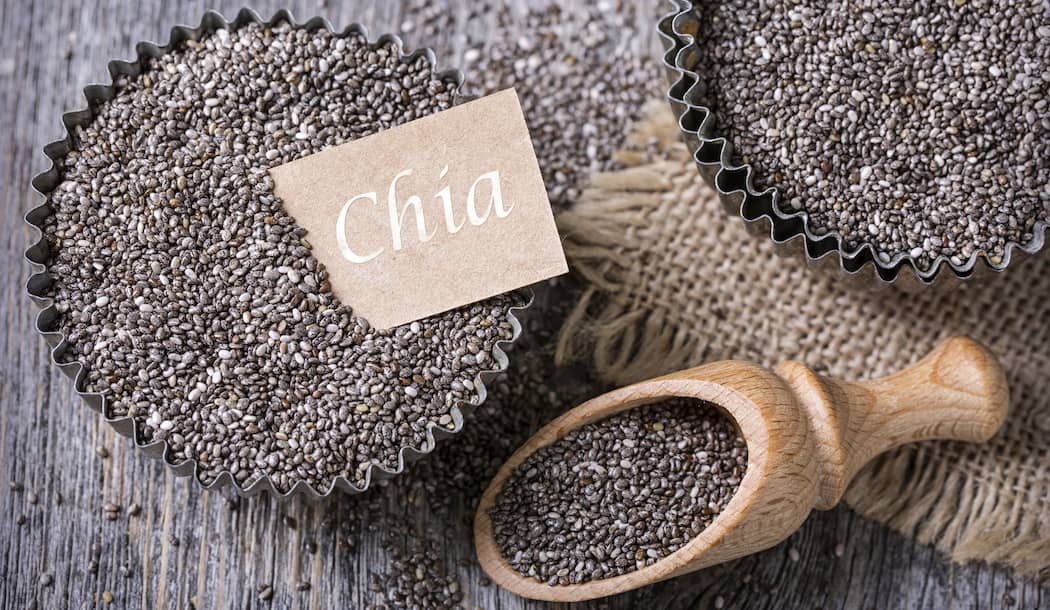
Imagine a seed so powerful that a single tablespoon of it can sustain you for 24 hours.
Going back as far as 3500 BC, the warriors of mid-American cultures like the Maya and Aztec knew the chia seed packed that kind of punch. In fact, these ancient warriors were so sure of this tiny black and white seed’s nutritional benefits that they used it as a basic survival ration and gave it as an annual tribute to Mayan and Aztec rulers.
Today, cancer researchers believe the value of chia seed extends beyond excellent nutrition. The latest research suggests that these mighty seeds can help treat cancer.
In Mayan, the word “chia” means “strength,” which speaks to the large amount of energy chia seeds supply to the body. Also known as Salvia hispanica, chia is a type of flowering plant from the mint family and is native to Guatemala and southern Mexico.
Among its many benefits, the chia seed is packed with protein. Chia is made up of about 20 percent protein and contains multiple amino acids and a variety of minerals, including iron, calcium, zinc, and magnesium. It's also rich in omega-3 fatty acids.
The nutritional profile of the chia seed helps with diabetes, weight loss, and heart disease, among other things. And because chia seeds are an excellent source of plant-based omega-3 fatty acids, they help balance cholesterol, reduce blood triglycerides, and lower inflammation.
But that’s not all…
Cancer-fighting properties
In a 2007 issue of the journal Prostaglandins, Leukotrienes and Essential Fatty Acids, researchers reported that oils from chia seeds carried anti-cancer properties, specifically targeting glandular breast tissue. Those oils appeared to limit tumor growth and metastasis by inhibiting mitosis (the replication of cancer cells) in mice.
In addition, chia seeds are a great source of alpha linolenic acid (ALA). A study published in the Journal of Molecular Biochemistry at the beginning of 2013 found high ALA levels induced apoptosis (cell death) in both breast cancer and cervical cancer cells, without causing damage to the surrounding, non-cancerous cells.
What’s more, the omega-3 fatty acids are loaded with anti-inflammatory fats, so among other things, they can help with side effects brought on by chemotherapy and radiation. That same assistance with inflammation may also help lower the risk of cancer recurrence.
Finally, chia seeds are high in both zinc and fiber, and each of these has been shown to help prevent and even treat a number of different cancers.
Not all of the studies are positive
On the flip side, according to research published in the journal BMJ Open, the high alpha linolenic acid (ALA) levels within chia seeds may actually promote the occurrence of prostate cancer in some individuals, although scientists are calling for further study.
A related question is whether or not too much of the omega-6 fatty linoleic acid found in chia seeds may contribute to cancer growth. For example, a study done by the National Institute of Environmental Health Sciences and the National Institutes of Health found that excessive dietary fatty acids including linoleic acid can cause patients with gastric cancer to sprout new blood vessels, which effectively feeds the growth of cancer (called angiogenesis).
While this evidence is concerning, I see it mainly as sending a message that we shouldn’t overdo it, meaning don’t have chia seeds with every meal. And truthfully, that’s one of the challenges with health foods like chia seeds and ground flax seeds – it is easy to sprinkle them onto or include them in every meal of the day, which helps any person trying to avoid disease think they’re doing themselves a lot of good. Too much of a good thing, as they say, is no longer a good thing.
Iskiate: Power drink of athletes
One of the more unusual qualities of the chia seed is its ability to absorb up to 12 times its weight in water. So, if you let chia seeds soak in a liquid for about 15 minutes, they puff up to become much larger (though still small) gelatinous masses, which, when consumed as a drink, are believed to help with hydration.
Vegans often take advantage of this gel-like phenomenon to create egg substitutes for cooking, called “chia eggs.” You simply mix a tablespoon of chia seeds with 2.5 tablespoons of water, let it sit for five minutes, and then the resulting gel-like mixture makes an excellent egg substitute for baked goods like pancakes, quick breads, muffins, and cakes.
If you want to see for yourself whether you get an energy boost from drinking chia, try this recipe for “Iskiate” from the Mexican Tarahumara tribe, which is famous for its long-distance sprinters. Just mix two tablespoons of chia seeds with two cups of water, squeeze in some lime or lemon juice, and add honey or agave syrup as needed. Nowadays this drink is sometimes called “Chia Fresca.”
Or just sprinkle the seeds on peanut butter toast or yogurt, or mix them into meatloaf, burgers, soups, or smoothies.
Best regards,

Lee Euler,
Publisher
References:
- “Chia Seeds, The Aztec Superfood.” By Mike of The Iron You blog, June 5, 2011.https://www.theironyou.com/2011/06/chia-seeds-aztec-superfood.html
- “Chia Seed History and Origin.” From the Ancient Grans Modern Nutrition blog. https://www.ancientgrains.com/chia-seed-history-and-origin/
- “How to Make a Chia Egg.” From Minimalist Baker, retrieved 3.5.21. https://minimalistbaker.com/make-chia-egg/
- “Does Eating Too Many Chia Seeds Cause Side Effects?” From Healthline, by Rachael Link, MS, RD on August 31, 2017. https://www.healthline.com/nutrition/chia-seeds-side-effects#TOC_TITLE_HDR_2
- “Case–control and prospective studies of dietary α-linolenic acid intake and prostate cancer risk: a meta-analysis.” By Amanda J Carleton, et al. BMJ Open. 2013; 3(5): e002280.https://www.ncbi.nlm.nih.gov/pmc/articles/PMC3657642/
- “Chia Seeds & Cancer.” By Dana Severson for Livestrong.com.https://www.livestrong.com/article/548297-chia-seeds-cancer/
- “3 nutrients cancer survivors should know.” By Molly Adams for MD Anderson Cancer Center, 9 August 2019. https://www.mdanderson.org/cancerwise/3-nutrients-cancer-survivors-should-know-flaxseed-omega-3s-iron.h00-159305412.html
- “Chia Seeds May Prevent Breast Cancer but Increase Prostate Cancer Risk.” From Heal With Food, retrieved 5 March 2021. https://www.healwithfood.org/breastcancer/chia-seeds-prostate.php